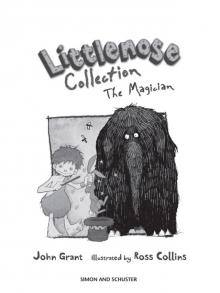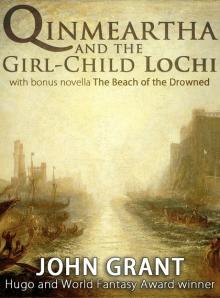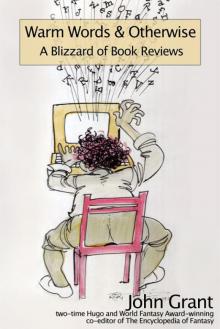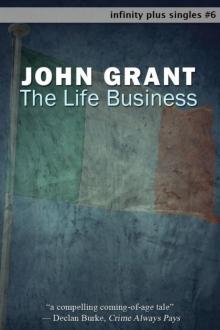- Home
- John Grant
Qinmeartha and the Girl-Child LoChi Page 2
Qinmeartha and the Girl-Child LoChi Read online
Page 2
"Long enough. Tea? You'll have to make it for us both, if you could. I seem to have been standing half the day."
Joanna put the kettle on, scuttled upstairs briefly to the loo, then filled the pot. The kitchen, normally as neat as one of those pictures in the colour supplements, was like the garden out the back: it gave the impression of being overgrown.
"What was Peter like, then?" said Aunt Jill as Joanna came back into the room, carrying the tray. "You never told me much about him on the phone."
She didn't sound very concerned. In fact, she sounded as if she were finding it an effort to formulate the words, like an actress suddenly thrust into a part without having been given the script, just told to muddle along as best she can.
"Not much to tell," said Joanna. And there wasn't. He had been fun to be with, but now it was an effort to conjure up even the image of his face or the sound of his laughter. Their brief fling had been somehow affectless, even at the time. And then, of course, he'd been abruptly out of her life – business had suddenly, by some astonishing coincidence, necessitated his departure to Glasgow for the next two years.
Leaving her, and a fetus developing inside her. And Mike – except Mike hadn't really come into it. Oh, he'd been there, of course: hanging around like a faithful spaniel, over-eager that they remain best friends, even though they were no longer lovers.
She hadn't had the heart to tell him that the child was his: he might have offered, in his gallant way, to marry her, or something embarrassing and confining like that. So instead she'd quietly arranged for an abortion.
She'd been surprised by how much of an argument the doctors and nurses had put up, pointing out that an abortion was a permanent thing: you couldn't change your mind about it afterwards. And then she'd been surprised by how completely they'd acquiesced as soon as they'd realized that her mind was set. She got the feeling that, even if she'd had second thoughts an hour before the op, they'd have been overridden by those now-impersonal persons.
The biggest surprise was the guilt, afterwards. It was as if it was only after the bond between them had been severed that she could start to recognize the fetus – the dead fetus, which she wasn't allowed to see – as a fellow human being. She didn't think of herself as a murderess, not quite; but she did have the haunting sensation, whenever she woke in the night, that perhaps she'd run someone over in the car and forgotten about it. Which was illogical, silly, a notion not to be entertained. But a notion which, alas, had gate-crashed, and showed no signs of departure.
Joanna didn't respond to her aunt's question. The old Aunt Jill would have seen her preoccupation, but the new one – this grandmother – didn't even seem to be interested.
"I had a good drive down," said Joanna. "The countryside always looks so gorgeous this time of the ..."
"You're looked after in my will," said Aunt Jill. "As you must have known you'd be. Say no more about it, now. Just so long as you know."
"Auntie!" She'd left the sugar in the kitchen. "Whatever brought that up?"
"I'm not as young as I used to was."
"You're not old."
"Amn't I?"
Looking at the pale face, with the bones of the cheek and jaw clearly demarcated beneath the wrinkled paper skin, Joanna could find no answer. Yes, whatever had happened in this past half-year, Aunt Jill was now indisputably old. No argument.
"I'll get the sugar," she said.
"As you wish, child." This time the arm on the worn yellow chair only half-rose, leaving the little dismissive wave uncompleted.
When Joanna located the sugar-lumps, tucked away near the back of the cupboard for the cleaning powders and washing-up liquid, she found they were stained and spotted with what she hoped was just old tea. On the spur of the moment she dumped them in the overflowing pedal bin.
"You're out of sugar," she said, back in the drawing-room. "I'll get some for you, later."
"Oh, don't worry about `later'. Tell me something about what's been going on."
A little of the vitality had returned to the old woman. She'd pulled herself more upright in the chair, and was drinking her tea black and sugarless.
"Well, they sacked me." When Joanna had first told her aunt on the phone there had been a shocked sucking-in of breath: in the old days people never got sacked unless it was for some gross breach of conduct. "They called it making me redundant, but it felt just the same as being sacked."
She'd been working for a publishing company, Rolfe and Baldwin. Mainly they published glossy novels with lots of sex in different countries that sold hardly at all in hardback but gained big paperback advances. Joanna had been an assistant editor for nearly five years, all the time telling herself that she was wasting her time – that sooner or later the right job would turn up at OUP or somewhere respectable, and then she'd be on her way. Instead, as Dave Rolfe had told her, the bottom had fallen out of the soft-porn market, and they were having to cut back. She'd got six months' salary and a big bunch of red roses.
"Well," said Aunt Jill, "you were never very happy there anyway. Not a great loss."
All at once Joanna felt an upsurge of fury. The last few months had been hell – Mike, Peter, the abortion, the redundancy, everything – and surely it was her entitlement to have some older person she could lean on, someone whose shoulder she could weep into, just like she'd wept into her mother's shoulder as a child. For almost a decade Aunt Jill had been that person: it was her job to be a sort of mother confessor, and she was failing to fulfil it just at the time Joanna most needed her to.
I should be sympathetic, she told herself sternly. I shouldn't be thinking about my own interests at all. I shouldn't be being so selfish. Aunt Jill's ill – she must be, and here am I worrying away about my own trivial concerns.
It was good advice, but the anger didn't go away. She watched her hand clenching on her knee.
"I'll go and make up my bed," she said. "And then I'll do some shopping. And clean the kitchen. You've been letting things get out of hand, I think. Have you seen a doctor?"
Aunt Jill produced a thin imitation of a snort.
"Doctor Grasmere? He gave me a prescription. The same prescription he gave me last year for my rheumatism. I think it's a special sort of medicine that's designed to make old biddies go away and stop pestering him."
It was the nearest to the old Aunt Jill that Joanna had seen since arriving here. She looked for the smile that should have accompanied the remark, but it wasn't there.
"I'll go and make up my bed," she repeated.
~
Aunt Jill was too tired to go out for a drink that evening – too tired to do anything much except keep her feet up in front of the television, not even clucking over the usual dreadful news about rioting in South Africa and further slaughter in Bosnia. Joanna, who had done some shopping, cleaned the worst of the kitchen and concocted a casserole to throw in the oven – all in a state of righteous fury – had no choice in the matter: she needed the drink, not for its own sake but just to get away from the funereal flat and its morbid occupant.
It's like the baby all over again, she thought as she clattered too noisily down the stairs. I'm already beginning to think of Aunt Jill as someone completely isolated from me, rather than just ... Aunt Jill.
The Blue Horse smelt of stale cigarette smoke and spilt beer, just the way it always did – but there the semblance of normality ended. It wasn't ever a noisy pub – not like the Customs House in Fleet Street, where the yobboes with bikes and leather jackets hung out – but this evening it was almost silent, as if the air were too thick to carry sound. The lights – fake gas-lamps that Jas had put in to replace the fluorescents his predecessor had installed – likewise seemed muted. There were a few other drinkers already there, one or two of whom she recognized enough to exchange nods with, but only Jas himself had any words for her.
"Miss Gard, down for the weekend," he said morosely.
"Hi, Jas," she replied, perching herself on a stool, trying to make herself
cheer up by pretending to. "A pint of ... Royal Oak, if it's on form."
"Royal Oak it is," he said, moving to the pump. He, too, had lost weight, she suddenly noticed. It was better disguised, because of the disreputable old suit and waistcoat he affected, but the jacket was loose on his shoulders and there were flaps of flesh around his chin and cheeks.
"What's going on?" she said as he put the pint on the towel mat in front of her and took her coins. "Not just here, I mean."
"What do you mean?" he said off-handedly.
"In Ashburton. It's not the same." She swung her arm to indicate the pub and the rest of the village beyond its walls. "My aunt's different – like there isn't as much life inside her as there used to be. And ..." She stopped. How can you tell someone, face to face, that they're looking bloody terrible? "And everything," she concluded limply.
"Not as I've noticed," Jas said. He was polishing his way along the optics with a torn tea-towel. "Have you noticed anything, Rupert?"
Rupert, whose job was something Joanna had never discovered but who was generally regarded as a townie because until last autumn he had commuted daily to Newton Abbot, looked up for the first time from his whisky and soda.
"Yes," he said indistinctly. "No. Young Joanna Gard, isn't it? Come to visit your aunt, have you? Fine woman, your aunt. Fine figure of a woman, too." He covered a belch with his hand. His fingers were nicotine yellow, like his moustache. "Few years ago I'd have ..."
Joanna never found out, thank God, what Rupert'd have, because the door opened behind her. She twisted round and saw a couple of young people – people her own age – coming in. It was as if someone had opened the windows in a morgue.
At first she didn't register them as anything other than blessed interruptions, but as they came closer to the bar she began to see them as people. The woman was, on second examination, somewhat younger than Joanna – she didn't look to be more than twenty, if that. She had long hair, a glossy black, and skin of a colour that looked as if it would become a tan within days of the first arrival of summer. Her lips were full, although her mouth was small. She glanced at Joanna briefly, her dark, nearly black eyes showing no sign of interest.
The man was older – he could even be thirty. He was in jeans and a faded green Marillion t-shirt. He was quite tall, and had the same night-black hair as the woman. It was clear from stray facial resemblances – the fleshy lips, the smallness of the mouth, the cleft marking the chin – that the two were brother and sister, not a couple, as she'd at first assumed. Yet, where the woman's face seemed quintessentially feminine, his was almost defiantly masculine.
Joanna turned away and stared at her drink. She'd not been much interested in men since the abortion – not remotely interested in them, if the truth were to be told – but this stranger was something different. Things were looking up in Ashburton if they could import talent like this, she reflected wryly. She tried to tell herself that there was something lofty and romantic in that original hot flash of attraction she'd felt, but was honest enough to acknowledge there hadn't been a lot of higher emotion involved.
"Guinness, Jas." She liked his voice, as well. Not hunkish: not wimpish, either. It had an accent that she couldn't for the moment place. "Tony?"
"Just a coke."
So the girl's name was Antonia. Probably. What was his?
"You're new here?" Joanna said, turning towards the pair. Oh, God, that must have sounded patronizing, she thought. I'm only sort of here on sufferance myself.
"You're a strange face as well," said the man, smiling guardedly. "You must be Jill Soames's niece."
"Yes. Joanna." News travels fast in Ashburton.
"Jas's told us about you, hasn't he, Tony?" He was laughing at her, but not unkindly. His sister didn't join in. "Don't worry, Joanna – it is Joanna, isn't it? – he's given us a good report of you."
"And you?" She wished she didn't feel so much like a schoolgirl all of a sudden. She remembered when she'd been in the sixth form the school had hired a temporary assistant cook who'd looked like a sort of unraddled Mick Jagger, and how she'd always turned her face away when she passed him in the corridor in case he was telepathic and would find out what she was thinking about him. She felt like that now.
"We've been here ... oh, four months now, I guess. Since Christmas. We moved into the big house at the other end of Ham's Lane, down by the playing fields."
"Aunt Jill told me Major Hunter had died. Was the house as much of a mess as everyone thought it would be?"
He looked at her gravely and adopted a portentous tone. "Significantly worse." He smiled. "Oh, boy, was it bad! Mother had to call in professionals in the end, just to get all the crap out of it. There was one entire cellar filled with broken glass. Seems he couldn't face putting his bottles out with the dustbins so he just slung them down there. Enough there to keep Coventry Cathedral in replacement windows for the next thousand years, I should think."
"It's not funny, Steve," said his sister, touching his arm. "He was a poor, lonely old man, that's all. Lay off him. Let him rest in peace."
"OK, OK." He pushed his sister's hand away. "I won't even mention the heaps of girlie maga –"
"Steve! There were no such –"
"Sorry, sorry."
"Do you like it here in Ashburton?" said Joanna. It sounded like the kind of question someone might ask at a school prizegiving – something that indicated the asker didn't want an answer. She lifted her glass to her lips as if somehow that would make the words sound wittier.
"As good as anywhere," said Tony. She started to say something else, but bit it back.
You were going to say, thought Joanna for her, that, just like in all these little places around the moor, the people don't take kindly to newcomers. Aunt Jill's been here for over three years, but they still, though they're friendly enough, treat her as if she were a weekend tripper rather than someone who's come here to stay.
"We're going to sit down," said Steve in that rich voice of his. "Join us?" He shrugged towards a table near the rear, where the loos were. Tony was already on her way across, holding her Coke out from her side theatrically, as if Jas would throw her out if she spilt any of it.
"Love to," Joanna said. "I don't really know anyone much around here."
She followed, amazed all over again by the contrast between these two rather beautiful people and the rest of the folk in the pub. They were bright splashes of acrylic set on the wall alongside twee, cautious watercolours. Greta, too, had had that same washed-outness about her. And Aunt Jill, of course ...
"I can't stop long," Joanna explained as she sat down. "My aunt – I've only just arrived – something in the oven ..."
"It's nice to meet you," said Steve forthrightly. He put his hand lightly on hers. "Ashburton's all right, like Tony was saying, but it's a bit – you know, dead."
Except when people like you two are around to breathe life into it, she thought. "As you said, I'm Joanna," she muttered. "And you?"
"Gilmour. Steve and Tony Gilmour. The idlest layabouts in an idle family, in case you were going to ask us what we do. Funny sort of question, that, now I come to think about it, and yet we're always asking it of each other."
For a moment Joanna was lost by him, unable to work out if "we" were Steve and his sister or the human species at large.
"As if you could tell more about a person from what they do between nine and five, by what they earn their meals from," Steve was saying, "than from whether they've just helped you out of a hole, or if they like Stockhausen better than the Black Crows, or ..."
Tony, who had been so indifferent to Joanna's presence when they'd met, now seemed to have decided she liked her. "You're burbling, Steve," she said. "You'll bore the poor woman before she's properly even met us."
"Tishwash, sister!" he said. "I'm sure that Joanna here has long ago decided that the sooner she can get out of this pub and never see us again, the happier she'll be. Am I right, Joanna?"
"Not at all," she said, f
lustered. "Quite the opposite, in fact." And that may sound like just the sort of courtesy you'd expect from me, but it's true, she added mentally. Truer than you could possibly imagine.
"But I do have to go." She gulped down half the remains of her beer – which, now she was paying attention to it, wasn't up to Jas's usual standards.
"Yes – you said." Steve's voice was sympathetic. "You have an aunt and a casserole to attend to."
"Something like that." And quite a lot else.
I think.
~
That night, hot though the night itself hadn't seemed to be hot, Joanna dreamed.
She was in a place where the sky was always light, a single mass of brightness that arched all the way from one horizon to the other. She knew quite a lot about her situation in this place, but not really enough altogether to explain it. There was a sun somewhere in the dome of radiance, but it was lost in the general brilliance: the sun never set, and it touched the atmosphere of this world into shining with the same unremitting vigour as itself.
There was no escape from the light. Here and there rocks stuck up out of the desert, and there were one or two scrubby-looking plants, but they cast no shadows. The radiance was not especially hot, but it was so bright that it burnt her as painfully as red-hot tongs, seeming to flay away the cornea of the single eye that seemed to be the entirety of her body's upper surface.
She slithered. It was the only way she could move. She could extend pseudopodia – indeed, she didn't even have to think about doing so: it just happened – and then drag herself a few painful centimetres across the abrasive desert surface, looking for shadows that were not there so that she could hide in them from the light that would not permit her to hide. It was silly to go on searching, she knew that; but she was unable to take the decision just to stop where she was, to give up the hope. It was as if, wherever this hell was, she'd been condemned to spend the rest of eternity hunting for a relief that would never be granted.

 Littlenose Collection The Magician
Littlenose Collection The Magician Qinmeartha and the Girl-Child LoChi
Qinmeartha and the Girl-Child LoChi Take No Prisoners
Take No Prisoners Warm Words & Otherwise: A Blizzard of Book Reviews
Warm Words & Otherwise: A Blizzard of Book Reviews Strider's Galaxy
Strider's Galaxy The Life Business
The Life Business